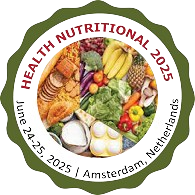Renowned Speakers

Ifigenia Giannopoulou
University of Brighton UK

Sophie McFarland
Coventry University UK

Maria Papamichael
La Trobe University Greece

Anna Omtzigt
Vrouw & klinieken Netherlands
Recommended Global Nutrition Webinars & Conferences
Asia Pacific & Middle East
Canada
HEALTH NUTRITIONAL 2025
- About Conference
- Scientific Sessions & Tracks
- Abstract Submission Criteria & Eligibility
- Participation/Presentation Option
- Young Research Award
- Market Analysis
About Conference
The 24th International Congress on Nutrition and Health, held in Amsterdam, Netherlands on June 24-25, 2025, was a landmark event in the realm of health and nutrition. Bringing together leading experts, researchers, policymakers, and practitioners from around the globe, the conference provided a platform for the exchange of cutting-edge research findings, innovative ideas, and best practices in the field.
With a focus on addressing the pressing challenges facing global health and nutrition, the congress featured a diverse range of topics spanning from the latest advancements in nutritional science to strategies for promoting healthy lifestyles and preventing chronic diseases. Participants had the opportunity to engage in thought-provoking discussions, attend interactive workshops, and network with peers across various disciplines.
Keynote speakers delivered insightful presentations on emerging trends and pivotal research findings, shedding light on the intricate interplay between diet, health, and disease. Breakout sessions delved deeper into specific areas of interest, exploring topics such as personalized nutrition, sustainable food systems, and the role of nutrition in maternal and child health.
Moreover, the congress served as a catalyst for collaborations and partnerships aimed at translating research into actionable policies and interventions to improve nutrition outcomes worldwide. Participants left the conference inspired and equipped with new knowledge and tools to advance the field of nutrition and promote health and well-being in their respective communities.
Overall, the 24th International Congress on Nutrition and Health was a resounding success, fostering dialogue, driving innovation, and mobilizing collective action towards a healthier, more sustainable future for all.
Scientific Sessions & Tracks
Nutritional epidemiology explores the complex interplay between diet, health outcomes, and disease prevention on a population level. By scrutinizing large-scale dietary patterns and health data, researchers aim to identify correlations between specific nutrients or dietary habits and various health conditions like obesity, cardiovascular diseases, and cancer. This field employs rigorous methodologies including cohort studies and randomized controlled trials to establish causal relationships, informing public health policies and dietary guidelines. However, challenges such as recall bias and confounding factors underscore the need for meticulous data analysis and interpretation. Overall, nutritional epidemiology serves as a crucial tool in understanding the intricate links between diet and health, guiding interventions for healthier populations.
Nutritional biochemistry delves into the intricate relationship between food and human health at the molecular level. It explores how nutrients interact with biological systems, affecting metabolism, gene expression, and overall well-being. From carbohydrates to vitamins, each nutrient plays a distinct role in physiological processes, influencing energy production, cell growth, and disease prevention. Understanding these mechanisms is vital for designing optimal diets to support health and prevent illness. Nutritional biochemistry also investigates the impact of dietary components on chronic conditions such as obesity, diabetes, and cardiovascular disease. Through research in this field, we unravel the complex web of nutrient metabolism, paving the way for personalized nutrition strategies.
Clinical nutrition encompasses the science of nutrition as it applies to the prevention and treatment of diseases. It delves into understanding the role of nutrients in promoting health and managing various health conditions. This field combines knowledge from biochemistry, physiology, and medicine to develop tailored dietary plans for individuals based on their unique needs and medical history. Clinical nutritionists work closely with patients to assess their nutritional status, identify deficiencies or excesses, and devise strategies to optimize health outcomes. By focusing on evidence-based practices, clinical nutrition aims to improve overall well-being and quality of life through personalized dietary interventions.
Nutrigenomics and Nutrigenetics
Nutrigenomics explores how nutrients interact with our genes, influencing health and disease risk. It delves into how dietary components can affect gene expression, metabolism, and overall health outcomes. On the other hand, nutrigenetics examines how genetic variations in individuals affect their response to nutrients, shaping personalized dietary recommendations. Together, these fields offer a deeper understanding of the intricate relationship between diet, genetics, and health. By leveraging this knowledge, researchers and healthcare professionals can tailor dietary interventions to individuals, promoting optimal health and disease prevention based on genetic predispositions and metabolic pathways.
Public health nutrition encompasses the critical intersection of public health principles and nutrition science, aiming to optimize the health and well-being of populations through dietary interventions and education. It addresses the complex relationship between food, health, and society, considering factors like food access, dietary patterns, cultural influences, and socioeconomic disparities. Key objectives include preventing malnutrition in all its forms, promoting healthy eating habits, and reducing the burden of diet-related diseases such as obesity, diabetes, and cardiovascular disorders. By advocating for evidence-based policies, community programs, and individual behavior change, public health nutrition strives to create environments that support nutritious food choices and foster lifelong health.
Nutritional psychology explores the intricate relationship between what we eat and our mental health. It delves into how dietary choices impact mood, cognition, and overall psychological well-being. Certain nutrients, like omega-3 fatty acids and antioxidants, are linked to improved mental function and mood regulation. Conversely, diets high in processed foods and sugars can contribute to mood swings, anxiety, and depression. Understanding these connections enables tailored dietary interventions to support mental health. By prioritizing nutrient-rich foods and adopting healthy eating habits, individuals can optimize their psychological resilience and enhance their overall quality of life. Nutritional psychology offers a holistic approach to mental wellness, emphasizing the crucial link between diet and mental health.
Functional Foods and Nutraceuticals
Functional foods and nutraceuticals represent a burgeoning field at the intersection of food science and health. These products offer not just sustenance but also specific health benefits beyond basic nutrition. With ingredients ranging from probiotics and omega-3 fatty acids to antioxidants and herbal extracts, they target various health concerns like digestive health, heart health, and cognitive function. The global market for functional foods and nutraceuticals continues to expand as consumers increasingly seek proactive approaches to wellness. As research advances, these products are poised to play an even more significant role in promoting health and preventing disease, offering a promising avenue for holistic well-being.
Maternal and child nutrition is a critical aspect of public health, laying the foundation for lifelong well-being. During pregnancy, a mother's diet directly impacts her baby's development. Adequate intake of nutrients like folic acid, iron, and calcium is essential for fetal growth and reducing the risk of birth defects. Following birth, breastfeeding provides optimal nutrition, offering antibodies that boost the infant's immune system. As the child grows, a balanced diet rich in vitamins, minerals, and proteins supports physical and cognitive development. Access to nutritious foods, education on healthy eating habits, and supportive healthcare services are vital for ensuring maternal and child nutrition and, consequently, a healthier future generation.
Nutrition Education and Counseling
Nutrition education and counseling are vital components of promoting healthy lifestyles. By imparting knowledge about balanced diets, portion control, and mindful eating habits, individuals can make informed choices about their nutrition. Counseling sessions provide personalized guidance, addressing specific dietary needs and goals, fostering long-term wellness. Educators emphasize the importance of nutrient-rich foods, such as fruits, vegetables, lean proteins, and whole grains, while also highlighting the risks of excessive sugar, salt, and saturated fats. Through interactive discussions and practical strategies, nutrition education equips individuals with the tools to navigate food environments confidently, empowering them to cultivate sustainable habits for optimal health.
Food Science and Technology intertwine the realms of biology, chemistry, and engineering to innovate, produce, and enhance food products. This multifaceted discipline delves into food composition, preservation methods, flavor development, and nutritional value. From understanding molecular interactions to optimizing packaging solutions, it explores every facet of the food chain. Advancements in this field lead to safer, more nutritious, and tastier food options while addressing global challenges like food security and sustainability. Whether it's designing alternative proteins or improving food safety standards, Food Science and Technology continually shape the way we grow, process, and consume food, driving progress in the culinary landscape.
Nutrition plays a crucial role in aging gracefully and maintaining vitality. As we age, our bodies undergo physiological changes, increasing the importance of a nutrient-rich diet. Essential vitamins like D and B12 become more critical for bone health and cognitive function. Adequate protein intake aids in muscle maintenance, preventing sarcopenia. Antioxidants found in fruits and vegetables combat oxidative stress, reducing the risk of chronic diseases. Moreover, hydration is vital for maintaining organ function and skin elasticity. By prioritizing a balanced diet rich in nutrients and fluids, individuals can support healthy aging, ensuring a higher quality of life in their later years.
Maintaining gut health is crucial for overall well-being, with the microbiota playing a pivotal role. This complex ecosystem of microorganisms residing in the digestive tract influences digestion, immunity, and even mental health. A balanced microbiota, with diverse species of bacteria, is linked to reduced inflammation and improved nutrient absorption. Prebiotic fibers, found in fruits, vegetables, and whole grains, nourish beneficial bacteria, while probiotics, like yogurt and fermented foods, introduce helpful strains. Lifestyle factors such as stress management and regular exercise also support a healthy gut environment. Prioritizing gut health promotes vitality and resilience throughout the body.
Environmental Sustainability and Nutrition
Environmental sustainability and nutrition are intricately linked aspects of our lives. Sustainable food practices not only promote human health but also safeguard the planet for future generations. Embracing plant-based diets reduces greenhouse gas emissions, conserves water, and preserves biodiversity. Local, organic produce minimizes the carbon footprint associated with transportation and pesticides. Additionally, sustainable farming methods prioritize soil health, ensuring nutrient-rich crops. By choosing sustainably sourced foods, we contribute to mitigating climate change and supporting ecosystems. Ultimately, integrating environmental consciousness into dietary choices is not just about personal well-being but also about fostering a healthier planet for all living beings.
Food Allergies and Intolerances
Food allergies and intolerances can significantly impact one's dietary choices and overall well-being. Allergies involve the immune system's reaction to specific proteins in food, triggering symptoms ranging from mild itching to life-threatening anaphylaxis. Common allergens include peanuts, tree nuts, shellfish, and dairy. On the other hand, intolerances result from the body's inability to properly digest certain substances, such as lactose or gluten, leading to digestive discomfort like bloating and diarrhea. Managing these conditions requires careful attention to ingredient labels, alternative food options, and often consultation with healthcare professionals for accurate diagnosis and personalized dietary guidance.
Nutrition plays a pivotal role in cancer prevention and management. A diet rich in fruits, vegetables, whole grains, and lean proteins provides essential nutrients and antioxidants, bolstering the immune system and reducing inflammation. Conversely, processed meats, sugary beverages, and excessive alcohol intake may increase cancer risk. Specific nutrients like vitamin D, found in fatty fish and fortified foods, are linked to lower cancer incidence. Maintaining a healthy weight through balanced nutrition and regular exercise also diminishes cancer risk. Overall, adopting a nutrient-dense diet with a variety of foods can serve as a powerful tool in the fight against cancer.
Nutrition plays a vital role in mental health, influencing mood, cognition, and overall well-being. Essential nutrients like omega-3 fatty acids, vitamins B and D, and minerals such as magnesium and zinc support brain function and mood regulation. Conversely, diets high in processed foods, sugar, and unhealthy fats can contribute to mental health disorders like depression and anxiety. Incorporating a balanced diet rich in fruits, vegetables, whole grains, lean proteins, and healthy fats can positively impact mental health by providing the necessary nutrients for optimal brain function and emotional stability. Additionally, staying hydrated and moderating caffeine and alcohol intake are crucial for mental wellness.
Precision Nutrition is renowned for its succinct yet comprehensive content, delivering a wealth of knowledge in just 100 words. Through evidence-based research and expert insights, it educates on nutrition's vital role in health and wellness. With a focus on practicality, it offers actionable tips for optimizing nutrition, making healthy choices, and achieving personal goals. From debunking myths to exploring cutting-edge science, Precision Nutrition empowers individuals to make informed decisions about their diet and lifestyle. With each concise piece, it fosters a deeper understanding of nutrition's impact on physical performance, mental well-being, and overall vitality.
Nutrition plays a pivotal role in managing inflammation within the body. Consuming a diet rich in anti-inflammatory foods such as leafy greens, berries, fatty fish, and nuts can help to reduce inflammation. These foods contain antioxidants and omega-3 fatty acids, which combat inflammation by neutralizing free radicals and inhibiting pro-inflammatory molecules. Conversely, a diet high in processed foods, refined sugars, and unhealthy fats can promote inflammation. By making conscious choices to prioritize nutrient-dense, whole foods, individuals can support their body's natural defense against inflammation, promoting overall health and well-being.
Nutrition plays a pivotal role in supporting immune function, serving as the foundation for a robust defense system against infections and diseases. Key nutrients like vitamins C, D, and E, along with minerals like zinc and selenium, act as potent antioxidants, bolstering immune responses and reducing inflammation. Additionally, a well-balanced diet rich in fruits, vegetables, lean proteins, and whole grains provides essential micronutrients and phytochemicals, fostering optimal immune function. Conversely, poor nutrition, characterized by excessive intake of processed foods, sugars, and saturated fats, can impair immune responses, making individuals more susceptible to infections. Therefore, prioritizing a nutrient-dense diet is paramount for maintaining a resilient immune system.
Nutrition and Neurodegenerative Diseases
Nutrition plays a pivotal role in the prevention and management of neurodegenerative diseases like Alzheimer's and Parkinson's. Research suggests that a diet rich in antioxidants, omega-3 fatty acids, and vitamins such as B12, D, and E can help protect brain health. Foods like fatty fish, nuts, seeds, fruits, and vegetables are beneficial due to their anti-inflammatory and neuroprotective properties. Conversely, a diet high in saturated fats and sugars may increase the risk of cognitive decline. Therefore, adopting a balanced diet with nutrient-dense foods is crucial for promoting brain health and potentially mitigating the onset or progression of neurodegenerative conditions.
Integrative Approaches to Nutrition and Health
Integrative approaches to nutrition and health emphasize a holistic understanding of well-being, acknowledging the interconnectedness of various aspects of life. It blends conventional nutritional science with complementary therapies, such as herbal medicine, acupuncture, and mindfulness practices, to optimize health outcomes. By addressing physical, emotional, and spiritual dimensions, these approaches aim to promote balance and prevent illness. They also recognize the importance of individualized care, considering factors like genetics, environment, and lifestyle. Through personalized nutrition plans, supplementation, and lifestyle modifications, integrative nutrition fosters sustainable health habits that support vitality and longevity.
Nutrition policy and advocacy play vital roles in shaping public health strategies, addressing food insecurity, and promoting healthy eating habits. By crafting evidence-based policies, governments can influence food production, marketing practices, and access to nutritious options, ultimately improving population health outcomes. Advocacy efforts amplify the voices of communities, pushing for equitable access to nutritious foods and challenging harmful practices. Collaborative initiatives between policymakers, healthcare professionals, and advocacy groups are crucial for developing comprehensive strategies that prioritize nutrition education, food security, and sustainable agriculture. Together, they can create environments where healthy choices are accessible and affordable for all.
Nutrition and sleep are fundamental pillars of overall health and well-being. A balanced diet rich in nutrients such as vitamins, minerals, and antioxidants not only fuels our bodies but also supports optimal brain function and mood regulation. Likewise, quality sleep is essential for cognitive function, mood stability, and physical recovery. Poor nutrition can disrupt sleep patterns, while inadequate sleep can lead to cravings for unhealthy foods. Prioritizing a nutritious diet and ensuring sufficient, restful sleep are vital for maintaining a healthy lifestyle and promoting longevity. By nurturing these aspects of our lives, we pave the way for enhanced vitality and resilience.
Nutrition and Cardiovascular Health
Nutrition plays a pivotal role in cardiovascular health, influencing factors like blood pressure, cholesterol levels, and inflammation. A diet rich in fruits, vegetables, whole grains, and lean proteins can lower the risk of heart disease. Omega-3 fatty acids found in fish are beneficial for heart health, while reducing saturated and trans fats helps manage cholesterol. Fiber-rich foods aid in maintaining healthy blood sugar levels and promoting weight management. Additionally, limiting sodium intake can help control blood pressure. Overall, adopting a balanced diet with mindful choices contributes significantly to cardiovascular well-being, reducing the likelihood of heart-related complications.
Abstract Submission Criteria & Eligibility
PRESENTATION REQUIREMENTS:
Authors presenting at the conference are required to cover their own registration, travel, and accommodation expenses. Please note that accepted abstracts will receive an acceptance email with instructions on how to register for the conference.
Abstracts will be compiled into conference books, which will be distributed to participants during the event.
In the event that a presenter is unable to attend, they must arrange for a qualified substitute to present their paper or poster. If such a change is needed, please notify our conference team promptly.
SUBMISSION OPTIONS:
Oral paper presentations will be allocated 30-minute time slots and will be organized into sessions based on thematic clustering. The keynote session will extend for 45 minutes, while workshops/special sessions will have duration of 60 minutes. Symposia will also be allotted 60 minutes, followed by a 5-minute Q&A session.
Graduate and Master’s students may submit their abstracts for consideration in the poster and e-poster presentation category.
PhD students are invited to submit abstracts for the special Young Researcher’s Forum (YRF), poster, and e-poster presentation category. It's important to note that the YRF category encompasses brief oral presentations specifically tailored for Ph.D. students.
Extended abstract: Here's a revised version of the instructions in the Abstract Template format:
Title: Submissions Utilizing the Abstract Template
Abstract: This abstract outlines the requirements for submissions utilizing the Abstract Template in the specified category. Papers submitted in this category may encompass original empirical research, theoretical development, reviews, or critiques. The format ensures consistency and clarity in presentation, facilitating comprehension and evaluation for reviewers and readers alike.
Keywords: Abstract Template, submissions, empirical research, theoretical development, reviews, critiques.
These abstracts follow the structure of the Abstract Template, providing a concise overview of the respective topics while adhering to the prescribed format.
Participation/Presentation Option
Oral presentation: Oral presentations are open to topics spanning research, theory, professional practices, or personal experiences, presented in a succinct manner. Individuals with personal insights are encouraged to share narratives aiding everyday life. Speakers allotted a 30-minute slot should aim for a speaking duration of 20-25 minutes, while Keynote speakers should target 40-45 minutes, reserving the remainder for questions and discussion facilitated by the Session Chair.
Workshop: Workshop presenters will cover the same topic as the oral presentation but delve deeper into specialized techniques with detailed demonstrations. The workshop will last approximately 45-50 minutes, allowing for in-depth exploration. Participants keen on joining can do so alongside their teams, collaborating with their research coordinators. Special group waivers will be available upon registration for these workshops.
Poster presentation: The Health Nutritional 2025 conference will be hosting a Student Poster Competition, aiming to foster the presentation of original research by students and recent graduates. Each presenter will have approximately 5-7 minutes to present their poster, which includes time for questions and answers. During the evaluation process, judges may pose questions to the presenters. This competition serves as an invaluable opportunity for emerging scientists to engage with the latest research in their field and enhance their skills as multidisciplinary researchers. Poster displays will be in hard copy format, measuring 1x1 meter.
For further information on Poster Presentation and Judging Criteria, please refer to the Poster Presentation Guidelines.
Webinar: The webinar presentation caters to interested attendees unable to participate in person due to scheduling conflicts or other commitments. In this alternative, the presenter can pre-record their session, which will then be featured during the webinar presentation session.
E-Poster: The e-Poster shares similarities with webinar presentations. During this session, participants will showcase their presentations in a poster format on the conference website. Additionally, the presenter's abstract will be featured in the conference souvenir and journal, complete with a DOI (Digital Object Identifier).
Exhibition: You're invited to participate in Health Nutritional 2025, an event showcasing products and services from various organizations including drug manufacturers, clinical trial sites, management consultants, chemists, pharmacists, business delegates, and equipment manufacturers—both commercial and non-commercial.
Discover booth details and benefits by visiting "Why Exhibit with Us?" For further inquiries, reach out to contact@europeanmeets.com.
Advertisement: We are delighted to extend a warm welcome to all esteemed participants to the upcoming “24th International Congress on Nutrition and Health," slated for June 24-25, 2025 in Amsterdam, Netherlands. Our conference program serves as an indispensable guide throughout the event, providing invaluable information for attendees as they navigate the sessions and networking opportunities.
Advertising within the conference program presents a prime opportunity to showcase your brand and services to a targeted audience, ensuring maximum visibility and long-term business prospects. Explore our diverse range of advertisement options and competitive prices by reaching out to us at contact@primecongress.com.
Moreover, consider elevating your presence and demonstrating your commitment to the field through our Premium Sponsorship package or explore additional sponsorship opportunities tailored to your preferences. For more details on our sponsorship packages, kindly contact our program manager at contact@europeanmeets.com or reach out via WhatsApp at +44-2045861247.
Join us as we convene leading experts, researchers, and professionals to exchange insights, foster collaborations, and advance the fight against health nutritional. We look forward to your participation in shaping this transformative event.
Young Research Award
Prestigious Award for Young Research’s at Health Nutritional 2025 – “Nutrition and Health”
Health Nutritional 2025 Committee is glad to announce “24th International Congress on Nutrition and Health” on June 24-25, 2025 in Amsterdam, Netherlands focusing on the theme: “Nutrition, Immunity, and Resilience: Building Stronger Communities” Health Nutritional 2025 developments are maintaining their momentum. Health Nutritional Conference program delves into strategic discussions.
Health Nutritional 2025 Young Scientist Awards:
Health Nutritional 2025 Committee is intended to honour prestigious award for talented Young researchers, scientists, Young Investigators, Post-Graduate students, Post-doctoral fellows, Trainees, Junior faculty in recognition of their outstanding contribution towards the conference theme. The Young Scientist Awards make every effort in providing a strong professional development opportunity for early career academicians by meeting experts to exchange and share their experiences on all aspects of Health Nutritional.
Young Research’s Awards at Health Nutritional 2025 for the Nomination: Young Researcher Forum - Outstanding Masters/Ph.D./Post Doctorate thesis work Presentation, only 25 presentations acceptable at Health Nutritional 2025 young research forum.
Benefits
- Young Scientist Award recombination certificate and memento to the winners.
- Our conferences provide best Platform for your research through oral presentations.
- Learn about career improvement with all the latest technologies by networking.
- Young Scientists will get appropriate and timely information by this Forum.
- Platform for collaboration among young researchers for better development.
- Provide an opportunity for research interaction and established senior investigators across the globe in the field.
- Share the ideas with both eminent researchers and mentors.
- It’s a great privilege for young researchers to learn about the research areas for expanding their research knowledge.
Eligibility
- Young Investigators, Post-Graduate students, Post-doctoral fellows, Trainees, junior faculty with a minimum of 5 years of research experience
- Presentation must be into scientific sessions of the conference.
- Each Young Researcher / Young Scientist can submit only one paper (as first author or co-author).
- Age limit-Under 35yrs
- All submissions must be in English.
Market Analysis
The market for Nutrition and Health has seen significant growth over the past few years and is expected to continue this trend through 2025. Below is an analysis of the key factors driving this market and its projected growth.
Key Drivers of Market Growth
1. Increasing Health Awareness:
- Growing awareness about the importance of nutrition and health among the global population.
- Rising prevalence of chronic diseases such as diabetes, obesity, and cardiovascular diseases that necessitate a focus on nutrition.
2. Technological Advancements:
- Innovations in food technology and nutritional science.
- Development of functional foods and nutraceuticals that offer additional health benefits.
3. Government Initiatives:
- Government policies and programs promoting healthy eating and lifestyle changes.
- Increased funding for nutrition-related research and public health campaigns.
4. Consumer Trends:
- Shift towards natural, organic, and non-GMO products.
- Growing popularity of plant-based diets and alternative protein sources.
5. Economic Factors:
- Rising disposable incomes, especially in developing countries, leading to higher spending on health and wellness products.
- Expansion of the middle class with a greater emphasis on healthy living.
Market Size and Projections
1. 2020:
- Market Value: $200 billion USD
- Focus Areas: Basic nutritional supplements, vitamins, and dietary plans.
2. 2021:
- Market Value: $220 billion USD
- Key Trends: Increased demand for immune-boosting supplements due to the COVID-19 pandemic.
3. 2022:
- Market Value: $250 billion USD
- Innovations: Rise in personalized nutrition plans using genetic information.
4. 2023:
- Market Value: $280 billion USD
- Expansion: Growth in online sales of health and nutrition products.
5. 2024:
- Market Value: $320 billion USD
- Developments: Introduction of more advanced functional foods and beverages.
6. 2025:
- Market Value: $350 billion USD
- Future Trends: Increased integration of AI and machine learning in nutrition and health tracking.
Conclusion
The Nutrition and Health market is on a robust growth trajectory, driven by technological advancements, increasing health consciousness, and favorable economic and government policies. This sector offers substantial opportunities for innovation and investment, with a significant impact on public health outcomes globally.
Graph Illustration
To visualize this data, a line graph could be plotted with the years (2020-2025) on the x-axis and market value (in billions USD) on the y-axis. This graph would show a steady upward trend, reflecting the growing market size over the analyzed period.
Would you like me to create a graph similar to the one previously made for Astronomy, Astrophysics, and Space Science, but tailored to the Nutrition and Health market?
Here is the market analysis graph for the Nutrition and Health sector from 2020 to 2025.
The graph shows a steady increase in market value, reflecting the significant growth and investment in the Nutrition and Health sector. This upward trend highlights the rising importance of health and nutrition in the global market.
To Collaborate Scientific Professionals around the World
Conference Date June 24-25, 2025
For Sponsors & Exhibitors
Speaker Opportunity
Useful Links
Past Conference Report
Supported By
All accepted abstracts will be published in respective Conference Series International Journals.
Abstracts will be provided with Digital Object Identifier by



